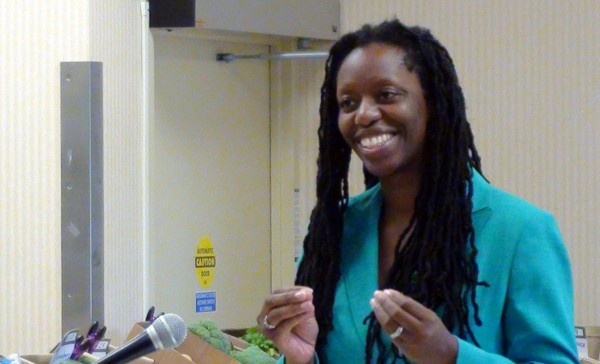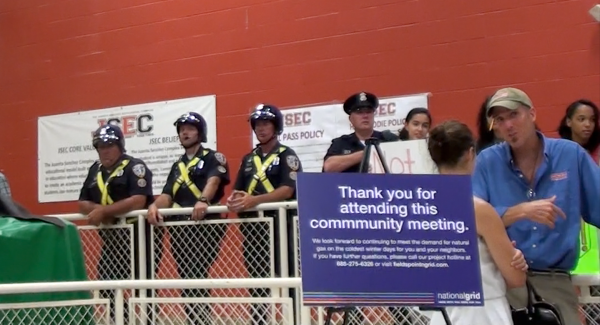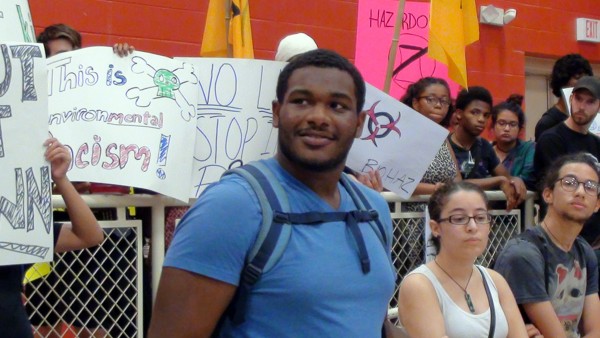 City Councilman Seth Yurdin (Ward One) is sponsoring a resolution that calls for a comprehensive analysis of National Grid’s plans to construct a natural gas liquefaction facility in Providence. Currently, National Grid has a liquefied natural gas (LNG) storage tank at Fields Point; the new plant would process natural gas and convert it to liquid form on site. The resolution will be considered by the full City Council on Thursday, March 17th.
City Councilman Seth Yurdin (Ward One) is sponsoring a resolution that calls for a comprehensive analysis of National Grid’s plans to construct a natural gas liquefaction facility in Providence. Currently, National Grid has a liquefied natural gas (LNG) storage tank at Fields Point; the new plant would process natural gas and convert it to liquid form on site. The resolution will be considered by the full City Council on Thursday, March 17th.
Yurdin, who has led multiple legislative initiatives addressing climate change and sustainability, said, “The proposal is a significant intensification of the current activity at National Grid’s Fields Point site—producing LNG is very different than storing it—and the impacts of that intensified activity need to be carefully and thoroughly studied, and communicated to the public.”
The LNG proposal is currently under consideration by the Federal Energy Regulatory Commission (FERC). Yurdin’s resolution notes that public health and safety, climate change, and environmental justice concerns must be evaluated closely as part of FERC’s review. The resolution states that, “Rhode Island is positioned to become a leader in renewable energy. . . supporting the proposed Fields Point liquefaction facility could undermine efforts to reduce Rhode Island’s reliance on natural gas and other fossil fuels.” Yurdin cited the Block Island wind farm, renewable energy incentives through Rhode Island’s Office of Energy Resources, and Providence’s ongoing initiative to divest from fossil fuels to exemplify the state’s leadership on addressing climate change.
“The development of the Fields Point liquefaction facility will continue to deepen our reliance on fossil fuels, when, in fact, we should be investing much more into clean, renewable energy sources,” Yurdin said. “The long-term cumulative impact of projects like the National Grid LNG will be devastating to our environment.”
Yurdin also noted environmental justice concerns regarding the facility’s proximity to South Providence and Washington Park—communities largely impacted by socioeconomic and health risks, including high rates of poverty, unemployment and asthma: “We cannot ignore that this project may increase health, safety, and environmental risks for already vulnerable populations living in close proximity to the site. We must address these concerns openly and fairly,” said Yurdin.
The resolution calls for a comprehensive environmental impact statement, which would include air quality and truck traffic studies; a risk management plan; and an inclusive public participation process. The City of Providence would hold public forums in multiple neighborhood locations and engage stakeholders to address concerns.
The resolution will be introduced at the City Council meeting on March 17, 2016 at 7 p.m., at City Hall, Council Chambers, Third Floor.
[From a press release]
]]>
Dr. Nicole Alexander-Scott, director of the Rhode Island Department of Health (RIDOH), responded to the Federal Energy Regulatory Commission’s (FERC) request for comments on National Grid’s plans to build a new liquefaction plant at Field’s Point on the south side of Providence.
The project has been the target of sharp criticism by environmental and social justice groups as an example of environmental racism, and much in Dr. Alexander-Scott’s assessment backs up such an assessment.
- FERC listens as no one speaks in favor of National Grids’ LNG facility
- Environmental racism and the Fields Point LNG Plant
- Southside PVD activists speak out against Fields Point LNG Plant
Though the director does not outright oppose the project, she does recommend that “FERC conduct a robust review of the project that fully incorporates public health perspectives and reviews potential public health concerns” and that RIDOH, “be deemed a cooperating agency, with all the rights and opportunities to participate in FERC’s review of this project preserved thereby.”
“Given the set of potential risk scenarios,” says Dr. Alexander-Scott in her final paragraph, “RIDOH requests that FERC consider requiring a Risk Management Plan for both the proposed liquefaction facility as well as the existing LNG storage facility, which does not currently have a Risk Management Plan.” [Emphasis mine]
“As Director,” says Dr. Alexander-Scott, “my strategic priorities for RIDOH are to address the social and environmental determinants of health, to eliminate health disparities in Rhode Island by promoting health equity, and to ensure access to quality services, especially for vulnerable populations.”
In her letter, Dr. Alexander-Scott outlines quite a few hazards and “risk scenarios” relative to the project.
Examining the proposal from a geographic standpoint, Dr. Alexander-Scott notes that the facility is planned within “an industrial area with a concentration of facilities listed in the EPA’s Toxic Release Inventory (TRI), facilities requiring Risk Management Plans (RMP), and Treatment, Storage, and Disposal Facilities (TSDF) that handle hazardous materials.”
Perhaps more critical “is the concentration of healthcare facilities and critical health system infrastructure within close proximity to the proposed project. Rhode Island’s only Level 1 Trauma Center is located in the Rhode Island Hospital complex, which includes Hasbro Children’s Hospital and is adjacent to Women and Infants Hospital. There are many additional primary care, specialty care, pediatric healthcare, and Federally Qualified Health Centers within this area of interest at varying degrees of proximity to the site location of the proposed facility. Providence Community Health Center’s administrative building and Chafee Health Center are within the half mile radius parcel map…”
Having this much emergency and non-emergency medical care infrastructure in one area, and an area so close to the proposed liquefaction facility requires “that careful attention be paid to any potential impacts to this critical healthcare infrastructure, including both for the cumulative impacts of construction and normal operation of the facility, and for any potential increased risk for accidents or emergency situations,” says the Director.
She sums up some of the potential accidents or emergency situations:
Although the possibility of an emergency or disaster may be low, the combination of multiple hazardous facilities, healthcare infrastructure, and vulnerable communities requires extra care and attention. Potential hazards may include leaks, fires, floods, earthquakes, hurricanes, storm surge, equipment malfunction, accident, terrorism, and the added risk of secondary offsite incidents including chemical incidents or explosions from co-located facilities requiring chemical risk management plans. RIDOH is concerned about the health impacts that would results from a worst-case scenario involving secondary impacts, which might involve amplified chemical reactions with substances such as chlorine, ammonium, and heat from flammable materials stored in co-located facilities. The close proximity to the I-95 highway corridor, and Rhode Island’s level 1 trauma center present an additional risk to the critical infrastructure needed for responding to any potential disaster situation. With a medically-vulnerable population and a relatively high percentage of people who are linguistically-isolated in the adjacent community, considerations around communications in disaster preparedness and response should also be taken into consideration as part of the environmental assessment and/or a broader emergency/risk management review.”
Though she doesn’t use the term “environmental racism,” Dr. Alexander-Scott provides numbers making it impossible not to draw such a conclusion.
“Socioeconomically,” says Dr. Alexander-Scott, “the one mile buffer around the proposed facility is 75 percent minority population…, 56 percent low-income…, 17 percent linguistically isolated… and 31 percent have less than high school education.” (86th percentile for state). The combined socioeconomics for the neighborhoods of Upper and Lower South Providence and Washington Park are 82 percent minority population…, 64 percent low-income…, 24 percent linguistically isolated… and 33 percent have less than high school education.” She notes that “these socioeconomic statistics are of important public health interest as significant social determinants of health.”
“RIDOH,” says the director, “has ample data on poor health outcomes, elevated health risks, and racial and ethnic health disparities within the City of Providence and in particular within the neighborhoods of Upper and Lower South Providence and Washington Park, which are in closest proximity to the proposed project. RIDOH’s 2014 Asthma Claims Data Report used health insurance claims data to produce detailed hot spot maps for asthma prevalence, emergency department visits, and hospitalizations, which all show asthma hot spots and elevated asthma risk in this focus area, at some of the highest levels in the state. Providence has the highest asthma-related pediatric hospitalization rates in the state, and asthma is elevated in low-income individuals and Black/African American and Hispanic/Latino communities.”
It seems that the efforts of National Grid, in building this facility, stand in direct opposition to the Department of Health’s mission to improve health outcomes in at risk neighborhoods.
“RIDOH is funding 11 Rhode Island non-profit organizations and local governments at various levels to support innovative approaches to improving health outcomes,” says the director. “The Department of Health and these grantees have created Health Equity Zones – defined geographic areas where high rates of obesity, illness, injury, chronic disease or other adverse health outcomes will be improved by coordinated strategies to reduce and manage chronic diseases, promote healthy lifestyles, improve birth outcomes, assure healthy child development, and create environments where healthy choices are easier to make. It is the vision of the Department of Health, that communities are engaged in democracy and committed to equality and diversity. Through these Health Equity Zones we will create and maintain sustainable and healthy places for all Rhode Islanders to live, work, and learn. It is imperative that alterations to the community’s landscape by other sectors does not impede the progress being achieved by such initiatives.”
Ironically, the build up of LNG infrastructure in Rhode Island will contribute to climate disaster, yet the location of the proposed liquefaction facility is at risk from sea level rise caused by climate change. Dr. Alexander-Scott doesn’t explicitly touch on this irony, but says, “Other environmental factors that are worth considering in the scope of the review include coastal flooding, both current and future levels given projected sea level rise, as well as potential storm surge and wind impacts. The effects of climate change on this project and therefore long-term population health is a necessary, additional component of the current environmental review.”
You can read the full letter from Dr. Alexander-Scott here.
]]> National Grid‘s plan to build a LNG liquefaction system at the Fields Point LNG Plant on Providence’s South Side met with vocal opposition from several environmental, social and economic justice groups and highlighted the issue of racial injustice in environmental politics. Representatives from the Providence Youth Student Movement (PrYSM), the Providence Student Union (PSU) and the Environmental Justice League of Rhode Island (EJLRI) took control of the room at one point to conduct a peaceful speak out for the benefit of representatives from both National Grid and FERC (Federal Energy Regulatory Commission.)
National Grid‘s plan to build a LNG liquefaction system at the Fields Point LNG Plant on Providence’s South Side met with vocal opposition from several environmental, social and economic justice groups and highlighted the issue of racial injustice in environmental politics. Representatives from the Providence Youth Student Movement (PrYSM), the Providence Student Union (PSU) and the Environmental Justice League of Rhode Island (EJLRI) took control of the room at one point to conduct a peaceful speak out for the benefit of representatives from both National Grid and FERC (Federal Energy Regulatory Commission.)
 The event, as planned by National Grid, was unusual. Instead of a series of presentations delivered from a stage, the presentations were arranged around the room in the cafeteria of the Juanita Sanchez Educational Complex. At each stop you could learn more about National Grid’s plans for installing a new plant for liquefying natural gas for storage in an existing tank. This had the effect of making each stop along the way a little more personal, as aspects of the project were explained in a one on one manner by National Grid reps.
The event, as planned by National Grid, was unusual. Instead of a series of presentations delivered from a stage, the presentations were arranged around the room in the cafeteria of the Juanita Sanchez Educational Complex. At each stop you could learn more about National Grid’s plans for installing a new plant for liquefying natural gas for storage in an existing tank. This had the effect of making each stop along the way a little more personal, as aspects of the project were explained in a one on one manner by National Grid reps.
 When I arrived, about an hour before the event started, I noticed the presence of five Providence police officers outside. Inside, the event was being watched over by two additional officers, one a lieutenant. There were some members of the community present, but most of those who attended seemed to be with the RI Sierra Club or Fossil Free Rhode Island and opposed to National Grid’s plan. Members of these groups were content to engage the various National Grid and FERC reps in conversation.
When I arrived, about an hour before the event started, I noticed the presence of five Providence police officers outside. Inside, the event was being watched over by two additional officers, one a lieutenant. There were some members of the community present, but most of those who attended seemed to be with the RI Sierra Club or Fossil Free Rhode Island and opposed to National Grid’s plan. Members of these groups were content to engage the various National Grid and FERC reps in conversation.
 When the young people representing PrYSM, PSU and EJLRI entered the room, they were followed in by the police officers from outside, three of whom were wearing their motorcycle helmets.
When the young people representing PrYSM, PSU and EJLRI entered the room, they were followed in by the police officers from outside, three of whom were wearing their motorcycle helmets.
“They’re motorcycle officers,” said the Lieutenant when I asked why seven police officers were needed, “That’s not riot gear. I just called them in.”
“So they were outside, directing traffic?” I asked.
“Yes,” he replied, “Once we clear here, they’ll go back to traffic duty.”
“I know from other actions I’ve covered that these are all decent kids,” I said.
 “We don’t know that,” said another officer, “We didn’t know who was coming, or how many. We saw a bus pull up and then we saw all the bullhorns and the lieutenant asked, ‘All right, who’s in charge?’ We just wanted to lay down some ground rules, some normal, by the law ground rules, and they just completely ignored us.”
“We don’t know that,” said another officer, “We didn’t know who was coming, or how many. We saw a bus pull up and then we saw all the bullhorns and the lieutenant asked, ‘All right, who’s in charge?’ We just wanted to lay down some ground rules, some normal, by the law ground rules, and they just completely ignored us.”
When I asked David Graves, media relations representative for National Grid about the number of police officers present, he said that initially, National Grid had asked for a two officer detail, but, “when those protesters were arrested this morning in Burrillville, the police department called us and we said that they should do what they feel is the right thing to do and assign a larger detail.”
Graves was talking about activists from FANG (Fighting Against Natural Gas) chaining themselves to the gate at the Spectra Energy Compressor Station. “I don’t think these people are associated with that group,” added Graves.
Still, it was hard not to see the sudden explosion of police on the scene occurring precisely when people of color arrived as anything other than an expression of the kind of institutionalized environmental and economic racism that the groups were protesting. For a primer on environmental racism, you could a lot worse than watching Jesus Holguin below.
The appearance of racialized policing was heightened when the activists from PrYSM, PSU and EJLRI left the room and all seven police officers followed them outside, leaving no police officers in the room. I note here that the two men arrested in Burrilville were white and middle-aged, like the people left in the room without police officers, not young people of color, who conducted themselves fully within the law and left the room in peace. One of the two men arrested in Burrillville, Dr. Curtis Nordgaard, commented on the treatment he experienced as he made his first foray through the criminal justice system, after being released from District Court on personal recognizance earlier the same day. “Part of why we can do this,” said Nordgaard, “is because of our privileged status.”
National Grid’s rep David Graves disagreed with much of what the various protesters said during their speak-out, but he knew the protesters weren’t trouble. “These kids are wonderful,” he said.
As the fight against environmental racism and for a clean energy future intensifies in the years to come, we should expect large corporations such as National Grid to increasingly rely on the government to use the power of the police to intimidate opposition. Billions of dollars are ready to be spent to prevent the transition to a clean energy future, and the billionaires in control of that money will not let go without a fight. As Dr. Noel Healy said, “There is no fixable flaw in fossil fuel industry business plan. We are asking a company to go out of business.”
]]> National Grid asked for public comment on their plan to build a LNG liquefaction system at the Fields Point LNG Plant on Providence’s South Side, and boy, did they get it. Representatives from the Providence Youth Student Movement (PrYSM), the Providence Student Union (PSU) and the Environmental Justice League of Rhode Island (EJLRI) took control of the room to conduct a peaceful speak out for the benefit of representatives from both National Grid and FERC (Federal Energy Regulatory Commission.)
National Grid asked for public comment on their plan to build a LNG liquefaction system at the Fields Point LNG Plant on Providence’s South Side, and boy, did they get it. Representatives from the Providence Youth Student Movement (PrYSM), the Providence Student Union (PSU) and the Environmental Justice League of Rhode Island (EJLRI) took control of the room to conduct a peaceful speak out for the benefit of representatives from both National Grid and FERC (Federal Energy Regulatory Commission.)
Julian Rodríguez-Drix of the EJLRI, did a great job outlining the dangers, from asthma to earthquakes. In under seven minutes Rodríguez-Drix basically presented every objection to the liquefaction expansion. He also told a chilling story of taking pictures of the LNG tank after the recent earthquake to see if it had suffered an damage, and his friend’s interrogation by the FBI as a result.
“This whole area is on the wrong side of the hurricane barrier. So a storm surge is just going to double back, protecting downtown, but hitting South Side doubly hard.”
Jesus Holguin of the EJLRI said, “All that pollution rains in our community, giving our community high rates of asthma.”
“So my mom just had a baby three weeks ago,” said Daniel, speaking on behalf of PrYSM. Daniel lives practically across the street from the proposed site. “You should already know that living there is not a safe place to raise a baby.”
Steven Roberts, of the EJLRI, openly doubted that the temporary construction jobs this project would create would impact his community at all. “We don’t know how many jobs have been set aside for folks in this disadvantaged community.”
“Slave ships create jobs, asbestos creates jobs, fracking creates jobs,” said Roberts, “we want people to have jobs and economic stability, but not on the backs of people who look like me…”
]]>